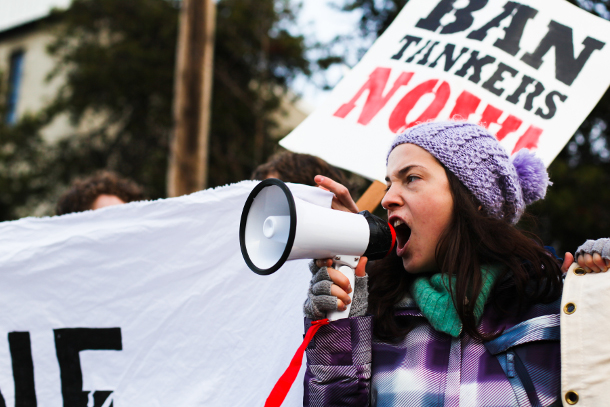With the federal government's monitoring of Northern Gateway pipeline critics, revealed last year, civil liberties advocates yesterday unveiled a new online tool that helps people find out if authorities are keeping tabs on them.
While the B.C. Civil Liberties Association admits there may be no data at all on most people, advocates hope the exercise will shed light on the right of citizens to file Access to Information requests on themselves. Revelations of government monitoring environmentalists and First Nations activists could prove the exercise a fruitful one, they say.
Several weeks before launching the resource, the BCCLA's executive director gave it a shot himself, and discovered there was enough data on him that an information officer asked him to narrow his search, although as a prominent advocate he added he's not surprised or concerned as he routinely interacts with the agency.
"There's a number of places my name appears," Josh Paterson said. "So far, I haven't hit pay-dirt and haven't got any of these requests back."
The new website is part of the organization's Don't Spy On Me campaign, and offers users suggested templates for personal information requests to federal departments including the RCMP, the Canadian Security and Intelligence Service, the National Energy Board, and Natural Resources Canada.
The BCCLA is also offering tips on navigating the system once a request has been filed for the government's $5 fee; such requests can take months, and can face higher fees if more than five hours of research is needed.
Who's keeping track?
While some might dismiss the initiative as a publicity stunt or overly paranoid, Paterson pointed to federal documents obtained last November by the Vancouver Observer which revealed that law enforcement kept tabs on First Nations and environmental activists' online activities, had knowledge of their private meetings, and had shared intelligence with oil companies.
In February, the chair of the Commission for Public Complaints Against the RCMP revealed he had opened an investigation into a BCCLA complaint over the allegations of spying on citizens.
"I have initiated a public interest investigation into the complaint of your client, the BCCLA, on Feb. 6, 2014," wrote the RCMP's Ian McPhail to the association's lawyer, citing section 45.43(1) of the RCMP Act which requires that, when "advisable in the public interest," an investigation or hearing be held into complaints about "the conduct, in the performance of any duty or function under this Act, of any member or other person appointed or employed under the authority of this Act."
While CSIS has insisted it does not spy on law-abiding Canadians, as prohibited by law, many have expressed concerns over the agency's close tracking of activist websites and social media activity -- known as "open-source" data gathering -- to produce threat assessment reports, particularly during National Energy Board hearings around B.C. and relating to Idle No More.
"Even if the information is open-source, that's something we need to know as well," Paterson argued, "There's a question about whether it's police business to keep track of the lawful, democratic activities of Canadians who freely broadcast what they're doing."
In a March 14 letter to the BCCLA, one of the spy agency's top officials replied to a complaint filed by the rights organization over the surveillance of activists.
"Our mandate includes... investigating and advising the Government of Canada on activities that may on reasonable grounds be suspected of constituting threats to national security," wrote Tom Venner, CSIS assistant director of policy and strategic partnerships, listing espionage, terrorism, extremism and subversion among such threats. "The CSIS Act expressly forbids the investigation of lawful advocacy, protest, or dissent. Such activities can only be investigated when they are carried out in conjunction with the threat-related activities cited above."
Venner refused the investigate the complaint further, arguing the BCCLA failed to provide "credible specifics of any wrongdoing or improper conduct, but said he understood "concerns that Canadians engaged in peaceful advocacy and protest would be targeted illegitimately by a Government agency."
'I'm hoping people will look and won't find much'
ForestEthics Advocacy campaigner Ben West said he is "curious about what the government has been doing or not," but as a vocal public figure against development of the oilsands, he's even more interested in whether ordinary citizens have been swept up in the surveillance nets -- not just professional environmental advocates like himself.
"I'm hoping people will look and won't find much," he said. "The scarier scenario is that people will find information and it freaks them out so they don't want to be involved [or] engage in democratic processes."
While Paterson admitted there isn't "hard evidence" of sweeping surveillance or monitoring of British Columbians, he said it's important for people to exercise their rights, dismissing one reporter's criticism that the online tool might be a waste government resources.
"If there is information there, it can be quite time-consuming. If there's no information, it tends to go much more quickly," said Paterson. "We don't have, at the moment, hard evidence of discreet individuals amassing major files with these agencies. But there's certainly a suggestion of that monitoring."
In January, the head of the body that oversees CSIS was forced to resign after revelations he was also registered as a lobbyist for Enbridge. Former Conservative MP Chuck Strahl stepped down as Canada's Security Intelligence Review Committee after concerns that he was in a conflict of interest. ![]()
Read more: Rights + Justice, Politics















Tyee Commenting Guidelines
Comments that violate guidelines risk being deleted, and violations may result in a temporary or permanent user ban. Maintain the spirit of good conversation to stay in the discussion.
*Please note The Tyee is not a forum for spreading misinformation about COVID-19, denying its existence or minimizing its risk to public health.
Do:
Do not: